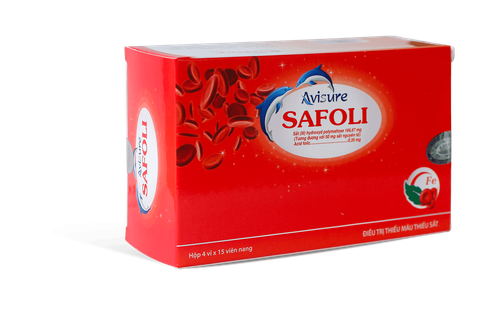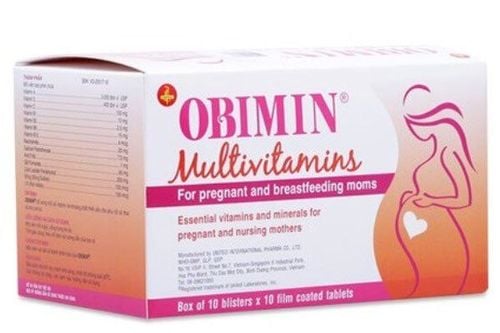This is an automatically translated article.
Folic acid plays an important role in the formation of cells and DNA. Low blood folate levels have been linked to a higher risk of birth defects, heart disease, stroke and even some cancers. However, excess folic acid from supplements can be harmful to health. strong1. Folate and folic acid overview
Folate and folic acid are water-soluble forms of B vitamins. Folate occurs naturally in foods and folic acid is the synthetic form of this vitamin. Folate is naturally found in green leafy vegetables, okra, asparagus, fruit, beans, yeast, mushrooms, meat (such as beef liver and kidney), orange juice, and tomato juice. Folic acid is used to prevent and treat low blood levels of folate (folate deficiency) and high levels of homocysteine in the blood (hyperhomocysteinemia). Women who are pregnant or may become pregnant take folic acid to prevent miscarriage and "neural tube defects". These are serious birth defects like spina bifida, when the baby's spine and back do not close in the womb. Folic acid is also used for many other conditions including depression, stroke, impaired memory and thinking skills in people older than the normal range for their age, and many others.2. Signs of folic acid deficiency
If a diet is complete and varied, folate deficiency is rare because it is found in many foods. However, the following conditions may put a person at increased risk of folic acid deficiency
Alcoholics. Because of the fact that alcohol interferes with folate absorption and accelerates the rate at which folate is broken down and eliminated from the body. Alcoholics also often have an unsafe diet, low in foods containing folate. Pregnancy. During pregnancy, folate requirements increase because it plays a very important role in the development of cells in the fetus. Diseases such as Celiac and inflammatory bowel disease are likely to decrease folate absorption. Surgery that involves the digestive organs or reduces the normal level of stomach acid can also interfere with absorption. People with a variant of the MTHFR gene are unable to convert folate into a form the body can use. Essentially the signs of a deficiency can be as follows: megaloblastic anemia (a condition that arises due to either a lack of folate in the diet or poor absorption of fewer red blood cells). and larger than normal), weakness, fatigue, irregular heartbeat, shortness of breath, trouble concentrating, hair loss, pale skin, mouth sores.

Những dấu hiệu cho thấy cơ thể đang thiếu axit folic
3. Folic acid toxicity
The limit for folic acid supplementation is 1,000 mcg per day because supplementing with higher amounts can cause the following health problems:
3.1 Concealing a vitamin B12 deficiency Deficiency is common in adults age or vegetarians. Both folate and B12 are involved in making red blood cells, and a deficiency in either can lead to anemia. A person taking high-dose folic acid supplements can correct their anemia and feel better, but the B12 deficiency persists. If symptoms of vitamin B12 deficiency persist for a long time, brain damage can occur and lead to irreversible nervous system delays. If you choose to take a folic acid supplement, stick to less than 400 mcg per day or less, as you'll likely get extra folic acid from fortified foods like cereals and breads, as well. as naturally occurring folate in foods.
3.2 Accelerate age-related mental decline Excess folic acid intake can accelerate age-related mental decline, especially in people with low vitamin B12 levels. Research done on healthy people over the age of 60 has linked high folate levels with mental decline.
People with high blood folate levels achieve this through consuming more folic acid in the form of supplements. People with high folate but low vitamin B12 were 3.5 times more likely to lose brain function than those with normal blood counts. Taking too much folic acid can affect mental health in older adults with low vitamin B12 levels. Furthermore, other studies have linked excessive use of folic acid supplements with mental decline.

Thường xuyên bổ sung thực phẩm chứa hàm lượng axit folic cao rất cần thiết cho cơ thể
3.3 Accelerate age-related mental decline Excess folic acid intake can accelerate age-related mental decline, especially in people with low vitamin B12 levels. Research done on healthy people over the age of 60 has linked high folate levels with mental decline.
People with high blood folate levels achieve this through consuming more folic acid in the form of supplements. People with high folate but low vitamin B12 were 3.5 times more likely to lose brain function than those with normal blood counts. Taking too much folic acid can affect mental health in older adults with low vitamin B12 levels. Furthermore, other studies have linked excessive use of folic acid supplements with mental decline.
3.4 Slowing down brain development in children Adequate folate intake during pregnancy is necessary for the baby's brain development and reducing the risk of birth defects. Because they don't get enough from food, women of childbearing age are often encouraged to take folic acid supplements. However, too much folic acid can lead to insulin resistance and slow brain development in children. In one study, 4- and 5-year-olds whose mothers took more than 1,000 mcg of folic acid a day during pregnancy, more than the tolerable intake, scored lower on tests of brain development. compared with children taking 400–999 mcg per day.
Another study has linked higher blood folate levels during pregnancy with a higher risk of insulin resistance in children 9-13 years of age.

Việc các tế bào khỏe mạnh tiếp xúc với mức axit folic thích hợp có thể bảo vệ chúng khỏi bị ung thư
3.5 Increases Cancer Revival Exposure of healthy cells to appropriate levels of folic acid may protect them from cancer. But exposing cancer cells to vitamins can make them grow or spread. Men previously diagnosed with prostate or colorectal cancer who took more than 1,000 mcg of folic acid per day had a 1.7%-6.4% higher risk of cancer recurrence.
Therefore, in order not to cause folic acid toxicity, before we intend to use it, we should consult a professional doctor. Taking the right dose for the right purpose always brings the best health benefits.
Vinmec International General Hospital is a prestigious and high-quality medical unit in examining, treating and consulting patients on all health issues. Therefore, when in need, customers can directly contact the hospital for support in all cases.
Please dial HOTLINE for more information or register for an appointment HERE. Download MyVinmec app to make appointments faster and to manage your bookings easily.
Source: webmd.com - healthline.com - hsph.harvard.edu












